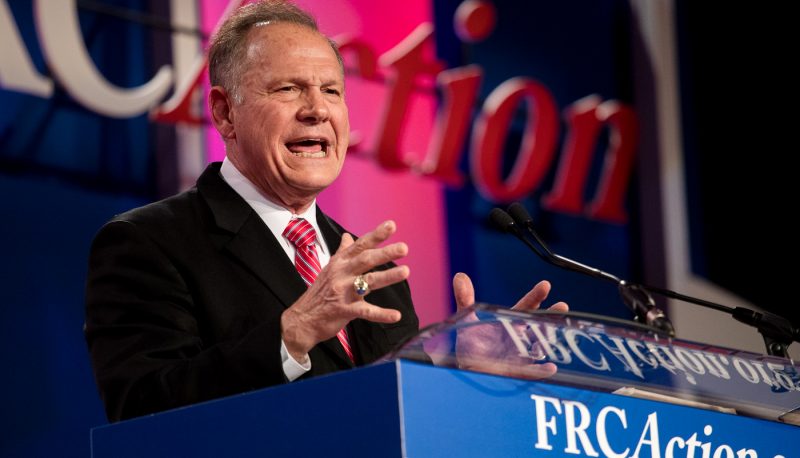Roy Moore, the former Alabama chief justice and Republican Senate candidate, told reporters today that he doesn’t support a religious test for public office, accusing the media of misrepresenting his position, according to a report from The Hill.
In 2006, shortly before Minnesota Democrat Keith Ellison was to become the first Muslim to serve in Congress, Moore wrote in a column for the far-right website WorldNetDaily that Ellison should not be allowed to take his seat in the House of Representatives because “a true believer in the Islamic doctrine found in the Quran” cannot truly “swear allegiance to our Constitution.” Earlier this year, Moore said that “false religions like Islam” are “completely opposite with what our First Amendment stands for.”
This all came to a head yesterday when Senate Majority Leader Mitch McConnell and Republicans on the Senate Judiciary Committee held a press conference on “religious liberty,” absurdly claiming that Democratic senators’ questioning of Trump judicial nominee Amy Coney Barrett amounted to the imposition of an unconstitutional religious test for public office. (Barrett is Catholic and was questioned about her writings on the conflicts Catholic judges face between the Church’s teachings and civil law.) Senators were joined by a group of Religious Right activists that included Penny Nance of Concerned Women for America, who said that Democrats should vote to confirm Barrett “with their most sincere apologies.”
Observers, including us, pointed out that this was all pretty absurd coming from a party whose current Senate nominee in Alabama had openly and explicitly called for an actual religious test for public office.
One speaker at the press conference, the Becket Fund’s Mark Rienzi, made a pointed reference to “some” who had said that Ellison shouldn’t be allowed to take office, saying that that was an unconstitutional view. But he was the only one to mention Moore until Sen. John Cornyn, who has endorsed Moore, was asked directly about the contradiction by a reporter. Cornyn evaded the question, saying, “Just because you’re a member of a political party doesn’t mean you agree 100 percent with what some other office holder or candidate for office feels.”
(Soon afterward, Sen. Chuck Grassley snuck behind some American flags to escape questioning about the indictment of Paul Manafort.)
Unless Moore explicitly says that he has changed his position on religious tests for office since he wrote that column in 2006, we can assume that he’s just not telling the truth about his position on the issue. Republican senators still have no excuse for supporting Moore while posturing about their support for “religious liberty.”







